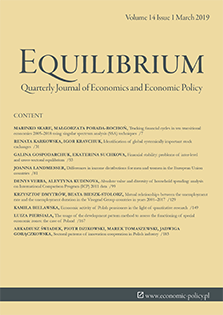Tracking financial cycles in ten transitional economies 2005–2018 using singular spectrum analysis (SSA) techniques
Tracking financial cycles in ten transitional economies 2005–2018 using singular spectrum analysis (SSA) techniques
Author(s): Marinko Skare, Małgorzata Porada-RochońSubject(s): Business Economy / Management, Political economy, Transformation Period (1990 - 2010), Present Times (2010 - today), Financial Markets
Published by: Instytut Badań Gospodarczych
Keywords: financial cycles; spectral analysis; countries in transition; turning points; duration;
Summary/Abstract: Research background: Financial cycles are behind many deep financial crises and it closely connects them with the business cycles, showing long memory properties and effects. Being closely connected with the business cycles, we must first explore the true nature of the financial cycles to understand the nature of the business cycles. Financial cycles are real, they have long memory properties and long-lasting effects on the economy. Purpose of the article: This study investigates the use of (SSA) in tracking and monitoring financial cycles focusing on ten (10) transitional economies 2005–2018. Methods: Singular spectrum analysis isolate significant oscillatory patterns (cycles) on housing markets with an average 4-years length. We isolate credit cycles just for Bulgaria, implying long memory properties of the cycles since this study investigated medium term (2–5 years) oscillations. Findings & Value added: The results prove the importance and advantages of using (SSA) in the study of financial cycles attempting to reveal the true nature of financial cycles as the principal component behind business cycles. Financial cycles show longer oscillations in the credit and property price series, which can explain 37.7%–49.9% of the variance of the total financial cycle fluctuations. Study results are of practical importance, particularly to policy-makers and practitioners in former transitional economies being vulnerable to adverse shocks on the financial markets. The results should assist policy-makers and financial practitioners in building and maintaining a sound financial policy needed to avoid future financial “bubbles”.
Journal: Equilibrium. Quarterly Journal of Economics and Economic Policy
- Issue Year: 14/2019
- Issue No: 1
- Page Range: 7-29
- Page Count: 23
- Language: English

